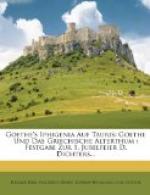|
This section contains 2,958 words (approx. 10 pages at 300 words per page) |

|
SOURCE: Hritzu, John N. “Dramatic Irony in Goethe's Iphigenie auf Tauris.” Monatshefte 36, no. 5 (May 1944): 217-23.
In the following essay, Hritzu commends Goethe's development of dramatic irony in his Iphigenie auf Tauris.
Irony of various species is a favorite device in all dramatic literature. Irony may be tragic, it may be dramatic; it may be directed consciously by the speaker, it may develop unconsciously; it may be sarcastic or ridiculous, satirical or humorous. In tragedy, especially in Greek tragedy, we are accustomed to that species of irony known as tragic. This species is employed when some catastrophe is about to befall a character in the drama, a catastrophe that is not known to, or forseen by, the victim, but is apparent to the spectators because they either know the plot of the drama or can perceive the catastrophe from the progress of the drama. Tragic irony may be of...
|
This section contains 2,958 words (approx. 10 pages at 300 words per page) |

|


